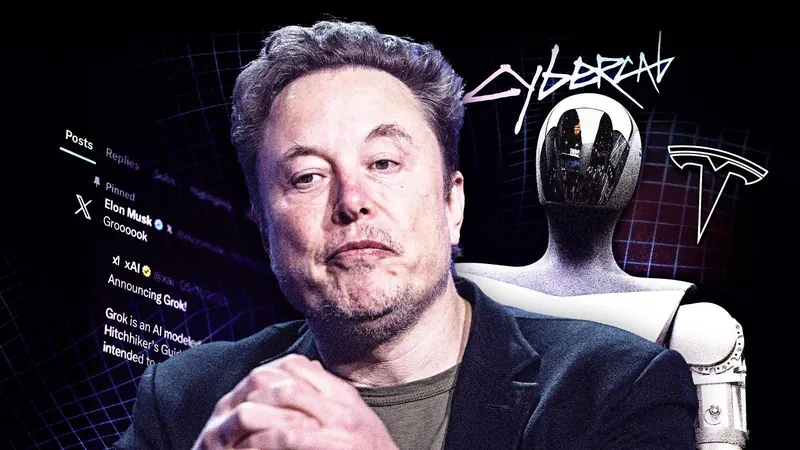
Is Tesla Truly the AI Titan Elon Musk Envisions? Unraveling the Myths Behind the Data-Driven Dream
2025-03-10
Author: Wai
Elon Musk's AI Vision for Tesla
Elon Musk has boldly proclaimed that Tesla will eventually dominate as the world’s leading AI company, leveraging vast troves of video data collected from its vehicles. However, is this optimism justified, or are there significant flaws in Musk's analysis of this competitive edge?
Tesla's Identity Redefinition
Tesla has redefined its identity from merely an electric vehicle manufacturer to what Musk insists is an AI company at its core. The reasoning behind this pivot is the immense data set—petabytes of video recorded as Tesla cars traverse roads globally, logging millions of miles. This data is positioned as a cornerstone for developing fully autonomous vehicles, a goal that aligns with Musk’s broader vision.
Challenges and Criticisms
However, the reality may not live up to the hype. While Musk sees a future where Tesla’s autonomous technology leads the way, experts caution that the data gleaned from everyday driving might not adequately prepare AI systems for the complexities of real-world driving. The challenge of creating a car that can navigate the roads as adeptly as a human involves far more than just pattern recognition, as seen in successful AI applications like OpenAI’s ChatGPT.
Driving encompasses a multitude of factors such as diverse weather conditions, unpredictable road patterns, and interactions with various other vehicles and pedestrians. For AI to be effective in this environment, it needs to be trained not only on common scenarios but also on rare edge cases that lead to accidents. Critics argue that an over-reliance on a large volume of driving data, particularly when it comes from average driver behavior—which often includes bad habits—may not yield a reliable level of safety.
Skepticism from the AI Community
Prominent figures in the AI community, like Yann LeCun, Chief AI Scientist at Meta, express skepticism regarding Tesla’s supposed edge in data collection. 'The hype surrounding big data is often overstated,' LeCun points out. He emphasizes that while an increase in data can enhance performance, it brings diminishing returns and still falls short of human levels of reliability. This raises the question: if more data does not guarantee better outcomes, what does?
Comparative Technologies
Tesla’s reliance on camera-based systems has also drawn criticism compared to its competitors who utilize advanced technologies such as laser lidar, which offers deeper insights by capturing three-dimensional images of surroundings. As Drago Anguelov from Waymo has noted, there’s a significant risk in depending solely on cameras for crucial safety features.
Musk's Ambitious Goals
Despite these challenges, Tesla remains undeterred. Musk’s vision also incorporates ambitious plans for humanoid robots and smarter factories, as he starts to pivot away from the previously set goal of producing 20 million electric vehicles by 2030. The reality is, solving automated driving could prove not only to be more practical but also financially lucrative in the form of electric robotaxis.
Setbacks and Undelivered Promises
Yet, Musk has repeatedly faced setbacks in meeting his ambitious objectives. His claims from 2016 about Tesla achieving fully autonomous driving without human oversight remain unfulfilled. Observers have pointed out Musk’s pattern of making grand proclamations about Tesla’s technology while not delivering on them.


 Brasil (PT)
Brasil (PT)
 Canada (EN)
Canada (EN)
 Chile (ES)
Chile (ES)
 Česko (CS)
Česko (CS)
 대한민국 (KO)
대한민국 (KO)
 España (ES)
España (ES)
 France (FR)
France (FR)
 Hong Kong (EN)
Hong Kong (EN)
 Italia (IT)
Italia (IT)
 日本 (JA)
日本 (JA)
 Magyarország (HU)
Magyarország (HU)
 Norge (NO)
Norge (NO)
 Polska (PL)
Polska (PL)
 Schweiz (DE)
Schweiz (DE)
 Singapore (EN)
Singapore (EN)
 Sverige (SV)
Sverige (SV)
 Suomi (FI)
Suomi (FI)
 Türkiye (TR)
Türkiye (TR)
 الإمارات العربية المتحدة (AR)
الإمارات العربية المتحدة (AR)